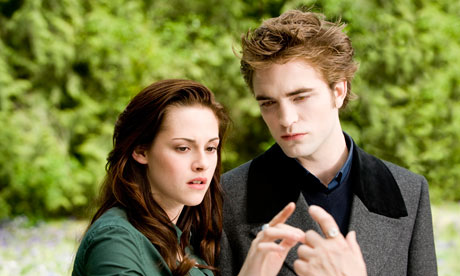
So. Twilight Eclipse. Wolfboy Jacob lurks nudely, rudely, buffly, looking ever-ready for some lupine tussling out yonder. Vampire Edward appears to be struggling with constipation. And Bella, how goes it with her? Do you know, I can't remember. Who is she? Nobody. What does she do? Nothing. Where is she without men? Nowhere. Want to know what Bella's secret power is? It's the power of negation. She's such a deadzone of psychic antimatter that supernatural mojo doesn't work on her. Other characters' magical skills simply dissolve when they encounter the sullen ringfence of her anticharisma.
Bella's passivity, the oppressiveness of her boyfriends (presented as protectiveness), the fetishisation of female victimhood and the unstinting justification of the guys' abusiveness have spurred a strong feminist backlash against the books – a backlash which I fully support. Part of our sense of disturbance and bafflement is that while all the misogynist elements of Twilight are detectable in mainstream arts and the media, they are rarely created by women.
Why would a dynamic, creative, prolific and talented woman like Stephenie Meyer write a protagonist as useless as this? Why would she create bullying males and set them up as love objects? Do young women despise themselves so much that the very best they can fantasise about is trailing around after not one but two bullies? It's puzzling. I grew up obsessively reading adventure novels by Tamora Pierce, the Worst Witch series and all sorts of bronze breastplate Amazonian guff. The women in these books bristled with chagrin and energy, as did their lovers, allies, enemies and friends. How could publishing have taken such a drastic backwards step in just 15 years?
It hasn't, actually. It's just that Twilight's broad success has eclipsed (sorry) the really interesting work for young-adult readers. As even the most cursory Amazon trawl will demonstrate, there are countless women writing brilliant heroines and nuanced heroes and supporting characters, without Bella's insipid man-worshipping, abuse-excusing pathology. The most exciting series out now is The Hunger Games by Suzanne Collins. Based around a lethal survival game with teenaged participants, these punchy, fierce books come barrelling off the shelves, all plots blazing. Be warned, they are too exciting to be read in bits. You'll finish them, panting with adrenaline, and want to run around the block throwing the pages into the faces of passers-by.
The characters in Justina Robson's science fiction/cyberpunk novels are foul-mouthed, ripped, funny, tough and chippy, as befits their dystopian settings, where anything bad might happen at any moment. The same goes for the paranoid heroine of Ann Aguirre's space fantasy novels, as well as the complex and enthralling Serrano space opera series by Elizabeth Moon, Kate Elliott's Crown of Stars and Crossroads series and Trudi Canavan's swords-cloaks-and-psychics novels. Patricia Briggs and Sheri S Tepper are also worth a dose to get Twilight's whiny wolves out of your system. Not all these authors are writing specifically for readers in their late teens – but book lovers in their age bracket will get hooked nonetheless.
I've saved the best for last. The prolific, erudite and consistently brilliant Celia Rees is justly renowned for her dizzyingly inventive plots, redolent of everyone from Angela Carter to Shakespeare. Sovay and Witch Child are two of her best-known books in the younger market, but she has written countless more, all equally breathtaking.
The same goes for Helen Dunmore. Dunmore is one of England's finest living writers, as her recent highly praised adult novel, The Betrayal (the sequel to the bestselling The Siege), proved. Her Ingo series invents a dark aquatic realm of haunted mermen and appropriately protean, shifting temptations and nightmare-challenges. If you want true literary genius, read Jeanette Winterson's young-adult novels, a stunning new facet of her career which began with Tanglewreck. They're too clever for me to summarise.
Finally, a secret favourite about which I will say little: the Black Jewels trilogy by Anne Bishop. A powerful witch queen is prophesied to come and save the world – or is it that she'll destroy the world? Who is this interloper? Is she a fraud? Does anyone actually want her? And what is she up against? … Look, just read them. Now.
So, back to Twilight. How does it compare? As Bella might say: whatever.

